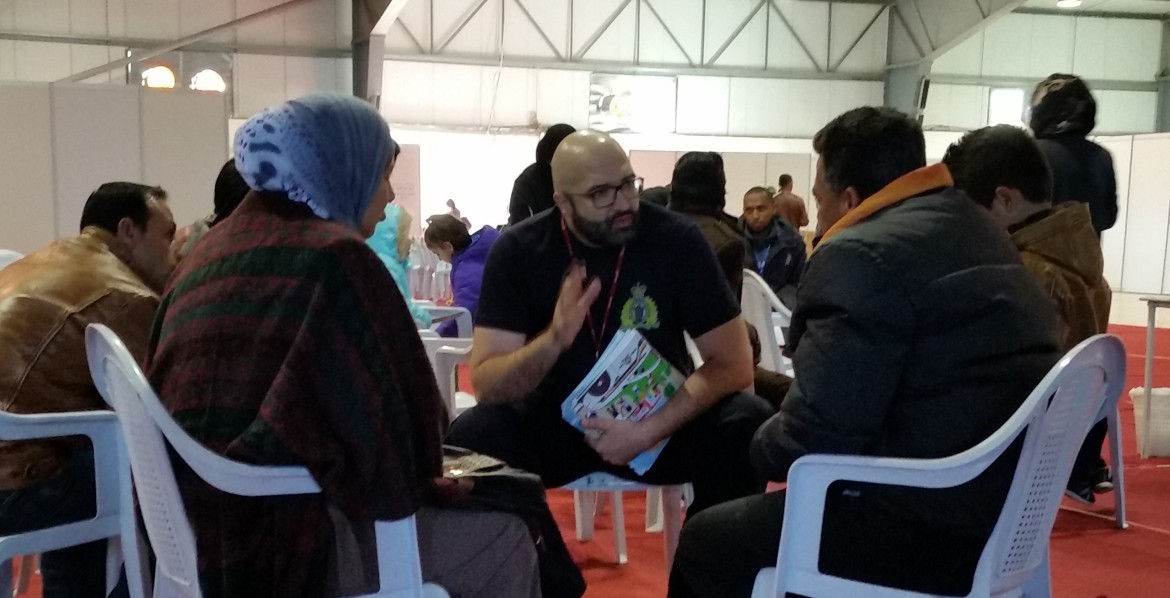Natalia Vega

Sam Jaroudi, of the RCMP interacting with children in Jordan. (Courtesy RCMP)
Sharing pride in Canada is at the heart of a new RCMP effort to educate police across the country on working with the more than 25,000 Syrian refugees who have arrived in the past few months.
“We didn’t try and sell them on it by saying ‘Canada is perfect’, at the same time we shared with them a lot of pride we had in Canada and our experiences,” said Sam Jaroudi, a senior project manager with partnerships and external relations with the RCMP in an exclusive interview with Humber News.
The Liberal government recently accomplished their goal of bringing over 25, 000 Syrian refugees to Canada but there is a cultural divide between locals and natives that both sides need to understand.
One way to help police across Canada in understanding Syrian culture is through a how-to document.
The RCMP have recently finalized an English and French power point presentation that will educate law enforcers on Canada’s newcomers.
The document, not yet released to the public, is being sent to RCMP divisions and other police agencies across the country. The idea behind creating the document started in November when the newly elected Liberal government first put forth plans to bring in Syrian refugees.
“Canadian police in general were thinking of how we can do more and help out more,” said Jaroudi. “We had a two-day meeting, we built a newcomer engagement strategy.”
Jaroudi said the strategy had three phases:
- To do the necessary research and learn about the issues the newcomers were facing
- Educate the newcomers on the laws in Canada, their rights and the role police officers have
- Create a bond so that trust could established
Want to know more? Listen to the broadcast below.
Throughout December, plans to send a small group of four (including Jaroudi) were made and on Jan. 7, the team was deployed to Jordan.
At that time, refugees were in the medical screening phase.
Jaroudi said the members deployed had two objectives when arriving on location.
“The first is to represent the police in a very positive manner and the second one was to engage with them and discuss their concerns and what they thought of police in Canada,” said Jaroudi.
One way of educating them about Canada and the police was through safety colouring books that had been translated into Arabic, he said.

Sam Jaroudi handing out the safety colouring books. (Courtesy RCMP)
Part of educating was to answer questions and concerns the refugees had.
“We had our answers, we wanted them to be factual and consistent and so we didn’t try and sell them on it by saying ‘Canada is perfect’,” said Jaroudi.
“At the same time, we shared with them a lot of pride we had in Canada and our experiences … They saw us, if we’re Arabic speaking police members, representing the police in Canada and coming to talk to them. That had a lot of weight to it.”
Another RCMP staff member who went to Jordan was Acting Sgt. Lina Dabit.

Acting Sgt. Lina Dabit speaking with Children at the processing centre in Amman, Jordan. (Courtesy RCMP)
Dabit said she came to Canada at a young age and that being able to speak the language and have a career helped her bond with the newcomers and inspire hope, especially among women.
“It provided them with almost an opportunity to see a real life success story,” said Dabit. “For them to have a female in that position, it’s not just someone telling them that females can be anything they want to be in Canada, it’s someone who’s from a similar culture who did the same thing.”
In addition to sharing her own story, Dabit also heard those of the refugees.
“For some of them, their stories were horrifying. Horrifying and heartbreaking,” said Dabit.
After spending ten days in Jordan, the RCMP group returned to Canada with inside knowledge to create the how-to document.
“For the RCMP’s perspective, I know that a lot of what we’re doing is being shared with our partner agencies, to help our membership sort of adjust to what the newcomers – what their mindsets are, what they’re thinking, what their challenges are,” said Dabit.
“You have to have that sort of element of empathy to some extent, but you also have to have that element of understanding.”
In an emailed statement on Tuesday, Jaroudi said the document might be released to the public in April.

